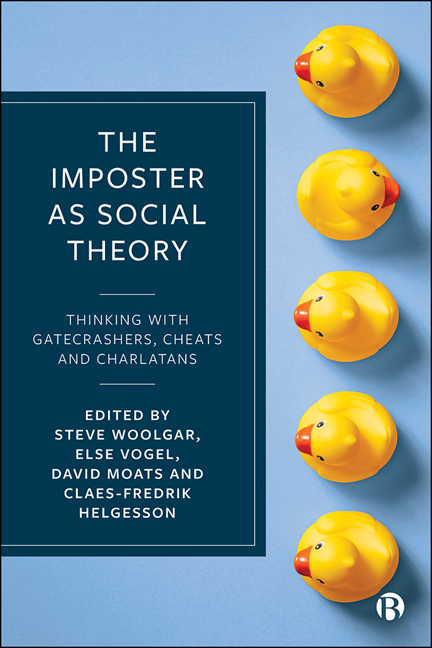Book contents
- Frontmatter
- Contents
- List of Figures and Boxes
- Notes on Contributors
- Preface
- 1 Thinking with Imposters: The Imposter as Analytic
- 2 The Desire to Believe and Belong: Wannabes and Their Audience in a North American Cultural Context
- 3 A Menagerie of Imposters and Truth-Tellers: Diederik Stapel and the Crisis in Psychology
- 4 Learning from Fakes: A Relational Approach
- 5 Imitations of Celebrity
- 6 Natural Imposters? A Cuckoo View of Social Relations
- 7 Conjuring Imposters: The Extraordinary Illusions of Mundanity
- 8 States of Imposture: Scroungerphobia and the Choreography of Suspicion
- 9 The Face of ‘the Other ’: Biometric Facial Recognition, Imposters and the Art of Outplaying Them
- 10 Faking Spirit Possession: Creating ‘Epistemic Murk ’ in Bahian Candomblé
- 11 The Guerrilla’s ID Card: Flatland against Fatland in Colombia
- 12 Good Enough Imposters: The Market for Instagram Followers in Indonesia and Beyond
- 13 Thinking beyond the Imposter: Gatecrashing Un/Welcoming Borders
- 14 Postscript: Thinking with Imposters – What Were They Thinking?
- Index
4 - Learning from Fakes: A Relational Approach
Published online by Cambridge University Press: 22 December 2021
- Frontmatter
- Contents
- List of Figures and Boxes
- Notes on Contributors
- Preface
- 1 Thinking with Imposters: The Imposter as Analytic
- 2 The Desire to Believe and Belong: Wannabes and Their Audience in a North American Cultural Context
- 3 A Menagerie of Imposters and Truth-Tellers: Diederik Stapel and the Crisis in Psychology
- 4 Learning from Fakes: A Relational Approach
- 5 Imitations of Celebrity
- 6 Natural Imposters? A Cuckoo View of Social Relations
- 7 Conjuring Imposters: The Extraordinary Illusions of Mundanity
- 8 States of Imposture: Scroungerphobia and the Choreography of Suspicion
- 9 The Face of ‘the Other ’: Biometric Facial Recognition, Imposters and the Art of Outplaying Them
- 10 Faking Spirit Possession: Creating ‘Epistemic Murk ’ in Bahian Candomblé
- 11 The Guerrilla’s ID Card: Flatland against Fatland in Colombia
- 12 Good Enough Imposters: The Market for Instagram Followers in Indonesia and Beyond
- 13 Thinking beyond the Imposter: Gatecrashing Un/Welcoming Borders
- 14 Postscript: Thinking with Imposters – What Were They Thinking?
- Index
Summary
Each society, each generation, fakes the thing it covets most.
(Jones, 1990: 13)Introduction
Imposters, as the contributions to this volume show, are promising figures to think with. Such thinking can take multiple forms and deliver various kinds of pay-offs for how we make sense of socio-material relations, of society. This chapter is about non-human imposters. The pay-off it aims to deliver comes from putting these ‘imitations of something cared about’ at the centre of the analysis, as protagonists rather than receptacles or intermediaries of the action. Doing this allows us to let them teach us – chiefly about two things: (1) what, in a given setting, is valued, and (2) how deception and its interception are distributed across ever-changing socio-material alliances.
Thinking with non-human imposters – which from now on I’ll call fakes – in this way starts by treating them as a recognizable class of objects, or more precisely: as objects recognized in the settings in which they operate as playing the part of ‘resembling the real thing but not being it’. Fake museum objects, online reviews, educational certificates, specialty coffee and archaeological artefacts are examples of such objects. Each will be featured in this chapter as the central actor in a specific story. This analytical move is warranted by how, in semiotics and its uptake in actor-network theory, an actant is defined as ‘[w] hatever acts or shifts actions, action itself being defined by a list of performances through trials’ (Akrich and Latour, 1992: 259). Fakes contribute to the action by bringing friction. ‘Resembling the real thing but not being it’ is ripe with narrative tension. Putting fakes at the centre of the action means we can learn from their adventures, from the responses to the appearance-reality puzzles they embody and the socio-material defences and countermeasures they evoke and anticipate. This is what I mean by ‘a relational approach’: following the fake brings various relations into relief. In and through their encounters, fakes can teach us how some corner of our world operates and is stitched together.
Such an approach might raise red flags for some, because it means solidifying and granting an identity to what many critical social scientists would keep in the realm of contested designations.
- Type
- Chapter
- Information
- The Imposter as Social TheoryThinking with Gatecrashers, Cheats and Charlatans, pp. 77 - 102Publisher: Bristol University PressPrint publication year: 2021



